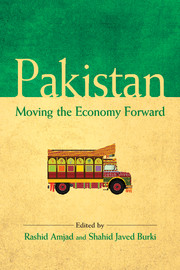Book contents
- Frontmatter
- Contents
- List of figures and tables
- Preface
- 1 Overview
- 2 Failed Economic Promise: Lessons from Pakistan's Development Experience
- 3 Economic Management Under IMF Tutelage: Key Lessons from the Musharraf and PPP Rule 1999–2013
- 4 A Country and an Economy in Transition
- 5 Tackling the Energy Crisis
- 6 Exports: Lessons from the Past and the Way Forward
- 7 The Future Path of Tax Reforms in Pakistan
- 8 Pakistan's Indus Basin Water Strategy: Past, Present and Future
- 9 Economic Governance and Institutional Reforms
- 10 Benefiting from Foreign Direct Investment
- 11 An Analysis of the Remittances Market in Pakistan
- 12 The Prospects for Indo-Pakistan Trade
- 13 Beyond the Poverty Line: A Multidimensional Analysis of Poverty in Pakistan
- 14 Can the New Intergovernmental Structure Work in Pakistan? Learning from China
- Contributors
- Index
8 - Pakistan's Indus Basin Water Strategy: Past, Present and Future
Published online by Cambridge University Press: 05 May 2015
- Frontmatter
- Contents
- List of figures and tables
- Preface
- 1 Overview
- 2 Failed Economic Promise: Lessons from Pakistan's Development Experience
- 3 Economic Management Under IMF Tutelage: Key Lessons from the Musharraf and PPP Rule 1999–2013
- 4 A Country and an Economy in Transition
- 5 Tackling the Energy Crisis
- 6 Exports: Lessons from the Past and the Way Forward
- 7 The Future Path of Tax Reforms in Pakistan
- 8 Pakistan's Indus Basin Water Strategy: Past, Present and Future
- 9 Economic Governance and Institutional Reforms
- 10 Benefiting from Foreign Direct Investment
- 11 An Analysis of the Remittances Market in Pakistan
- 12 The Prospects for Indo-Pakistan Trade
- 13 Beyond the Poverty Line: A Multidimensional Analysis of Poverty in Pakistan
- 14 Can the New Intergovernmental Structure Work in Pakistan? Learning from China
- Contributors
- Index
Summary
Introduction
Pakistan's Indus Basin Irrigation System (IBIS) is the strong heart of the country's economy. Its creation is a tribute to the British irrigation engineers who created the original system (1847–1947) that Pakistan inherited in 1947, and to the Pakistani irrigation engineers and institutions (particularly the Water and Power Development Authority [WAPDA] and the provincial irrigation departments) who have spent the last 60 years adding new dams and barrages, building new link and branch canals, and modernizing and maintaining the world's most complex and extensive irrigation system.
From the 1950s onward, the IBIS has also been the product of the generosity and intellectual input of a host of international experts and international institutions, particularly the World Bank. This chapter starts with a review of what has been accomplished to put the IBIS into perspective and illustrate the magnitude of the effort put into building the present system. The chapter's aim is to sketch the task ahead and develop a coherent national strategy for the preservation of the IBIS for the future.
The Indus basin: The first decade 1947–57
The Revelle Report commissioned by President Kennedy following a request from President Ayub Khan in 1961 provides a fascinating look at Pakistan in this period. It paints a West Pakistan of 43 million people, malnourished and desperately poor with an average income of less than 20 cents/day, and an average life span of less than 45 years, with a 10 per cent rate of literacy—“industrious, frugal, progressive … their watchword: ‘our sons will have it better’” (US Department of the Interior, Panel on Waterlogging and Salinity in West Pakistan, 1964, p. 35).
Pakistan at this time was overwhelmingly rural. There was a magnificent canal irrigation system based on the River Indus and its five tributaries (the Jhelum, Chenab, Ravi, Sutlej, and Beas), but it was plagued by its seasonal nature and lack of surface storage (nearly half the flows went to sea unused in the summer, with less than 2 feet/acre left for the irrigated land).
- Type
- Chapter
- Information
- PakistanMoving the Economy Forward, pp. 198 - 223Publisher: Cambridge University PressPrint publication year: 2015
- 1
- Cited by



